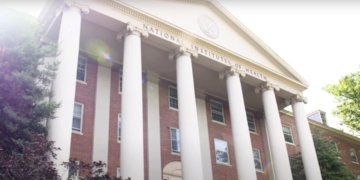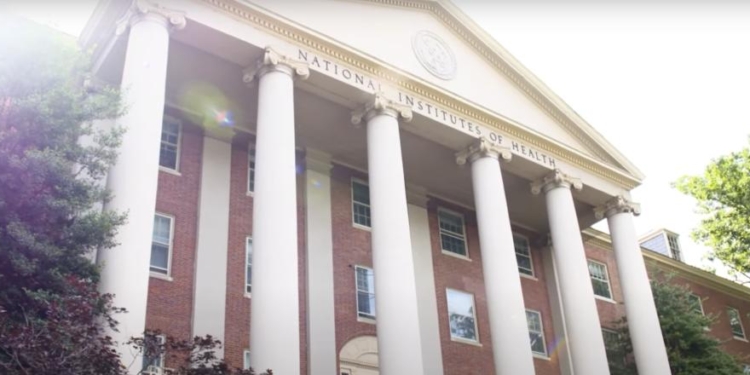A two-sentence paragraph in a new guidance document to National Institutes of Health grant managers brings a five-year surge of COVID-19 research funding to a screeching halt.
Chief grants management specialists at each of the NIH’s 27 institutes and centers have been instructed to “completely excise” grants that clash with the Trump administration’s priorities. A Tuesday NIH directive broadens the categories of research that clash with the administration’s priorities to include research on COVID-19, according to Nature magazine.
“The end of the pandemic provides cause to terminate COVID-related grants,” the guidance document reads. “These grants were issued for a limited purpose: to ameliorate the effects of a pandemic. Now that the pandemic is over, the grant funds are no longer necessary.”
Some grantees can submit an appeal.
The directive will have wide-reaching implications. A search of NIH RePORTER, a directory of NIH grants, shows 2,500 projects mention “COVID” in the project title or abstract. Funding for these projects totals $3.8 billion.
COVID-19 joins five other issues flagged for defunding: DEI, certain collaborations with “countries of concern” like China and South Africa, transgender issues, vaccine hesitancy, and climate change.
Department of Health and Human Services Secretary Robert F. Kennedy Jr. said on Monday that the department had grown considerably under the prior administration while health outcomes declined.
“Under the Biden administration, HHS’s budget grew by 38% and staffing increased by 17%, yet public health outcomes declined,” he said. “We’re committed to restoring our health agencies to their gold-standard tradition of evidence-based science — through greater efficiency and accountability.”
Before entrepreneur Elon Musk’s Department of Government Efficiency (DOGE) began making changes at the NIH, grant cancellations were exceedingly rare. The permanent cancellation of a grant that underwrote high-risk coronavirus virology in Wuhan, China, through nonprofit EcoHealth Alliance required more than four years and a congressional investigation.
Democrats opposed to DOGE’s actions at NIH have emphasized the institutes’ successes like advances in drug development and the Human Genome Project. But the NIH’s legacy has been affected in recent years by its connections to the coronavirus research at the pandemic’s epicenter and the efforts by leaders like former National Institute of Allergy and Infectious Diseases Director Anthony Fauci to conceal them.
According to the Nature report, the Trump administration considers rank-and-file NIH program officers to be too biased to identify which grants should be eliminated, echoing experts who say that program officers are disincentivized from eliminating funding because it would shrink their portfolio of grants to manage.
In addition, up to $11 billion in funding for COVID public health programs could be cut, the Department of Health and Human Services confirmed Tuesday. Several state public health programs indicated in statements to the Daily Caller News Foundation that they would have to cut programs. Two acknowledged that some funding had been reapportioned to non-COVID priorities.
“The COVID-19 pandemic is over, and HHS will no longer waste billions of taxpayer dollars responding to a non-existent pandemic that Americans moved on from years ago,” HHS Director of Communications Andrew Nixon said in a statement about the CDC cuts. “HHS is prioritizing funding projects that will deliver on President Trump’s mandate to address our chronic disease epidemic and Make America Healthy Again.”
NIH Director Jay Bhattacharya, who was confirmed to the role Tuesday evening, pledged to end gain-of-function research — research that enhances the deadliness or contagiousness of a pathogen. The new directive far exceeds that pledge. It appears to have been sent under then-Acting Director Matthew Memoli before Bhattacharya’s confirmation.
The Office of Long COVID Research and Practice is expected to close, according to a report.
It’s also not clear what the directive means for burgeoning research into COVID-19 vaccine injuries or “post-vaccine syndrome” — a term scientists at Yale School of Medicine and the Mount Sinai Health System recently coined in part to secure more funding for its study.
Another major program to be cut is the Antiviral Drug Discovery Centers for Pathogens of Pandemic Concern (AViDD), nine projects totaling $577 million to develop new drugs to treat infectious diseases, according to Science magazine.
One of these projects is helmed by University of North Carolina virologist Ralph Baric, whose work with the Wuhan Institute of Virology has generated concern since 2020.
But Rutgers chemical biology professor Richard Ebright, a fierce critic of Baric, said the AViDD program should by and large be preserved.
All content created by the Daily Caller News Foundation, an independent and nonpartisan newswire service, is available without charge to any legitimate news publisher that can provide a large audience. All republished articles must include our logo, our reporter’s byline and their DCNF affiliation. For any questions about our guidelines or partnering with us, please contact [email protected].


























